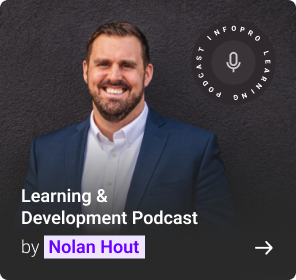The sales landscape is always changing due to technological innovations, customers’ changing needs, and market fluctuations. Effective sales methodologies are widely adopted, but most salespeople struggle to use them effectively in this modern environment. Preparing sales teams for success requires a proactive and forward-looking approach to sales training strategies. The old-school playbook of product-driven sales and fierce closing techniques is fading fast in its effectiveness.
Today’s smart customers arrive informed, demand personalization, and value authenticity. Sales professionals must evolve from transaction enablers to trusted advisors who can navigate complex buying journeys and forge lasting partnerships. So, sales training strategies for 2025 need to focus on these key success drivers: applicable digital and data skills, empathy, adaptation, and a desire to learn.
Here’s what to look out for in terms of key sales training strategies in 2025:
Achieve Sales Success by Maximizing Your Tech Ecosystem
The digital sales revolution is not futuristic; it is the current state of sales. Digital channels are becoming more deeply embedded in every step of the sales process, changing how businesses interact with customers. Sales training needs to focus on digital capabilities, ensuring teams have the skills to leverage customer databases and social selling platforms, virtual communication tools, and data analytics dashboards effectively. This includes:
- Lead Handling: Once leads enter the database, the next focus is handling them effectively—from lead scoring to task optimization, follow-ups, and outreach tactics. The training should focus on analyzing the data to derive tangible outcomes.
- Prospecting: Generating and nurturing leads through digital platforms and personal interactions. Training should focus on ethical social selling practices, content creation strategies and constructive online relationships.
- Virtual Selling: As remote and hybrid work models thrive, virtual selling is no longer a “nice to have” skill. Online training must center around video conferencing courtesy, virtual presentation skills, digital collaboration tools, etc.
- Data-Driven Insights: Data is becoming a central part of business decision-making, and sales professionals are no exception. Training should teach the sales reps to leverage sales data, analytics, and reporting to make informed decisions, predict trends, and optimize strategies.
Leverage Data to Make Decisions and Deliver Insights to Help Sales
In the big data era, instincts alone won’t cut it. Train sales teams to interpret insights using data-driven strategies, involving training in:
- Sales Analytics and Reporting: Understand key sales metrics, interpret sales reports, and identify trends and patterns within sales data. Training programs should include using collected sales data and other business performance data to evaluate sales performance regularly. This analysis helps to understand where improvements need to happen and track progress against targets.
- Data-Driven Lead Scoring and Prioritization: Learn to utilize data-driven lead-scoring methodologies to focus on high-potential leads, increase lead conversion rates, and optimize sales resource allocation. Sales reps should be trained in lead scoring methodologies and using sales platform features for prioritization.
- Market and Customer Data Analysis: While the training programs focus on various aspects of selling, here are some skills and functions that specifically help sales professionals equip themselves with the skills needed for market and customer data analysis programs. Teach them to use data-driven information, market analysis, and customer segmentation frameworks.
- Data-Enabled Personalization: Analyze customer traffic and personalize conversations with the sales rep. Training should include using ethical data to aid in personalizing messages and developing the audience’s trust through accurate and relevant communication.
Build Stronger Connections with Emotional Intelligence and Empathy
Technology is undoubtedly burgeoning; however, the human touch is quintessential. One of the key strategies for sales training in 2025 is to develop training materials that empower the participants’ emotional intelligence (EQ). This enables sales professionals to connect with clients, build meaningful relationships, and create genuine connections, including:
- Active Listening and Empathetic Communication: Facilitate workshops to improve active listening, empathy, and understanding of customer pain points. Practice scenarios and coaching during sessions can help overcome communication barriers.
- Developing Trust and Relationships Remotely: Develop authentic communication skills for building customer trust and relationships in digital interactions. Training should cover body language, tone of voice, and strategies for establishing personal connections in digital interactions.
- Negotiation Skills and Empathy in Objection Resolution: Develop negotiation skills like a pro and learn to respond to objections and resolve conflicts empathetically. That means training on empathetic objection-handling frameworks and conflict-resolution techniques.
- Diversity and Inclusion Awareness: As companies work toward diversity and inclusion, training should teach about unconscious bias and respectful communication to prepare sales leaders to interact with customers of any background.
Agile and Continuous Learning for Sales Organization Adaptation to a Rapidly Changing World
The sales landscape is evolving rapidly, requiring sales training strategies to shift from being a singular event to ongoing, adaptive programs. This requires:
- On-Demand Training Modules: These break training programs into easily digestible micro-lessons that can be consumed on demand. This enables salespeople to learn at their own pace and target specific skills needing improvement.
- Personalized Learning Path and Skill Development Plans: Designing individualized learning paths that cater to the specific needs of each sales professional. According to their individual career development goals, they focus on acquiring key skills relevant to their role and performance expectations. Using skills assessments and performance data to guide personalized learning plans.
- Role of Peer-to-Peer Learning & Knowledge Sharing: Facilitate peer-to-peer learning and knowledge sharing across the salesforce to maximize internal expertise and build a collaborative learning ecosystem. This can be achieved through regular team meetings, workshops, and training sessions where team members can share their experiences and best practices. Encouraging a continuous learning and open communication culture will also help foster a collaborative environment within the salesforce.
- Active Learning and Engagement: Foster learning by doing through conversations, practice scenarios, and challenges rather than sitting through a lecture. Managers should train and rate performance by employing 360-degree employee feedback.
Conclusion
The evolving sales landscape demands proactive training strategies. Sales leaders will cultivate a high-performing salesforce by focusing on digital technologies, data literacy, emotional intelligence and agile learning. A workforce capable of navigating complex environments through a balance of technical and human skills is essential. So, are you ready to future-proof your sales team and win in 2025? Why not contact us today and see how our customized sales training offerings can help your organization achieve ongoing sales success? Let’s build your sales team’s future together.





